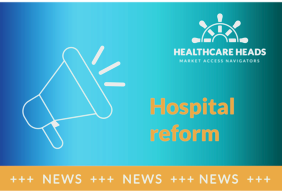A dramatic improvement in healthcare was promised by Prof. Lauterbach on June 29th, 2023, during a press conference on the hospital financing reform in Germany.
However, Healthcare Heads does not share this assessment.
The planned hospital financing reform in Germany is causing uncertainty and controversial discussions. After yesterday's consultations between the federal government and the states (Länder) on the reform, and the communicated results in a press conference, it appears that the healthcare system in Germany could dramatically deteriorate.
In this post, we will take a closer look at the reform and its potential implications for the medical industry.
- Disagreement on the modernization of hospital structures and financing:
The hospital structures, planning, and financing undoubtedly require modernization to ensure a high-quality and needs-based healthcare system in the future. However, there is significant disagreement between hospitals, federal states, and the federal government regarding the approach and proposals of the government commission. The reform is scheduled to start in January 2024, but the current developments raise doubts about its feasibility. The measures proposed by Health Minister Lauterbach are also not convincing. - Specific special regulations and budgeting:
The federal states have increasingly enforced specific special regulations into the reform. For example, university hospitals receive special consideration in terms of financing, and all surcharges and deductions, including fixed cost degression, will be integrated. There will also be a special budgeting for pediatrics and obstetrics. These are generally positive developments. However, we do not perceive any signals from either the states or the federal government that more funds will be made available for these tasks. The Level Ii hospitals and numerous other structural projects (digitalization, hybrid DRGs and ambulatory care, health kiosks, climate protection, and modernizations) also require a budget. It should be noted that modern medical technologies such as robot-assisted surgery, cyberknife, or cardiac catheter treatments require equipment that falls under investment financing and, therefore, are not funded through the allocated budget. The allocated budget (60%) is financed through a normative reduction in operating cost financing (DRG system). - Jeopardizing medical care and cold structural consolidation:
As a result, we expect a cold structural consolidation and a threat to medical care, especially in sparsely populated areas in Germany, as a consequence of the current developments and the lack of financial resources. Long waiting lists are also expected as many hospitals will are supposed to leave the market.
Questions that the medical industry should ask:
- What are implications of the reform for specific technologies, such as surgical procedures involving expensive materials like implants?
- Would you like to know more about the hospital reimbursement reform and its impact on your technology?
- Which services will hospitals strategically choose to avoid or priotize in the future?
- What does the reform mean for procedures involving expensive investments and equipment?
- Will the measures curb the treadmill effect and the increase in treatment volume?
- What are the implications of the measures for modern medical technologies with high investment costs?
- How can hospitals that might survive the transition be identified? According to current media reports 70% of hospitals in Germany are in the red and 18% are at risk of bankruptcy with a rising trend.
- How can the medical industry support its customers in this process?
Contact us, and we will be happy to help answer these and other questions. We don't have a crystal ball to predict the future, but we understand the technical aspects and mechanisms in detail, and we can use this knowledge to provide you with a reliable assessment.
Get in touch with us for non-binding consultation.
Author: Sven Sauermann
Telefon: +49 431 800 1470
E-Mail: info@healthcareheads.com


